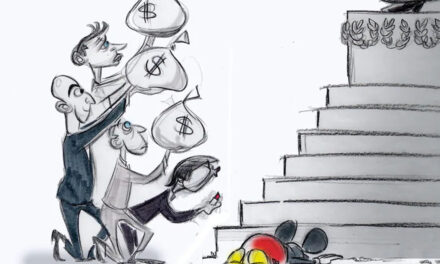
Horist: A Personal Look at John McCain
John McCain’s deciding vote to terminate the process of repealing and replacing the doomed Obamacare is sadly characteristic of the Arizona senator. Justifiable sympathy for his terminal illness and appropriate respect for his service and sacrifice as a prisoner of war in Vietnam has masked the more disturbing qualities of his character – qualities perhaps best seen on the floor of the Senate.
While his current bout with brain cancer may explain the more recent publicly noted irrational questioning of former FBI director James Comey, who actually expressed confusion over the questions, there is a much longer history of erratic behavior. It tends to manifest itself in two traits – uncontrolled seething angry over minor issues, with occasional private outbursts, and an egomaniacal focus on his self-importance.
His occasional and inexplicable lapse of rationality has been observed and criticized throughout his political career. McCain’s opponent in the 2016 election, medical Doctor Kelli Ward, alluded to his history of mental issues when she drew attention to the fact that the senior senator is “…already known as an angry man.”
This past history was also noted in a 2008 article in U.S. News and World Report, which said, “While questions of age and health have shadowed McCain, they have largely remained under the radar.
Ezra Klien wrote in The American Prospect in 2008, “John McCain has an anger problem. But not the one many political observers presumed he’d have. He has not lost his temper at a questioner, blown up at a reporter, or exploded during a debate. Rather than a swift detonation, he has settled into a slow burn. He seethes.”
In that same presidential campaign, a Slate article addressed McCain’s history of mental issues in a much more colorful way. Christopher Hitchens wrote:
“What a good time to shift the subject to the temperament (or temper) of Sen. John McCain and to hint, as did Michael Leahy in a, major piece in the April 20 Washington Post, that we should wonder whether the Republican nominee has his tray table in the fully locked and upright position, whether he lives happily or unhappily in his own ZIP code, whether there are kittens in his granary or bats in his belfry, and whether his elevator goes all the way to the top.”
The reporting of his mental stability is so abundant from his earliest political career – often attested to in private by friends — that it is difficult to imagine these revelations are merely the product of political enmity.
In fact, I had my own experience with McCain.
Before his presidential run, I was asked to escort the senator on a fundraising visit to Chicago. At that time, he was number one on my list of favorite politicians. As I left the house to meet with McCain, I expressed to my wife my unabashed enthusiasm for the opportunity to spend time with the senator. Upon returning home, she was shocked by my report. I was only half jesting when I told her that I damn near kicked McCain out of my car on Lake Shore Drive.
McCain was traveling with two of his congressional aides. He spent the first part of the ride showing them pictures of himself and famous world leaders in a demeanor of a bragging teeny-bopper music fan having been photographed with Kid Rock. I could not help but feel that the performance was more for my benefit, assuming that the aides must have seen his photo collection more than once. I could not help but wonder why he carried it with him.
The situation went from odd to worse.
In a belief that we were going to be late for his first appointment (and we were not) he became very agitated, firing off are fuselage of belligerent anger at his aides for bad scheduling and for me for not driving fast enough. I am sure his aides must have seen this irrational performance in the past. I would describe them as cowering in silent intimidation and embarrassment as the senator vented without any interest in a response. As we arrived at our location ahead of schedule, McCain had returned to his previous pleasant demeanor as if none of the rage had transpired.
In 2008, I voted for McCain over Barack Obama, but not without great trepidation. As I watched McCain cast that final vote on health care, I did not see that old hero or a profile in courage. Rather, I saw a man consumed by secret seething anger and an unhealthy monumental ego – a man smugly paying back his perceived enemies while making himself the most important person on the evening news.
Larry Horist is a conservative activist with an extensive background in political policy. Clients of his consulting firm have included such conservative icons as Steve Forbes and Milton Friedman. He has worked for the White House under Presidents Nixon and Reagan and was a one-time candidate for mayor of Chicago. As a recognized authority on public policy and political issues, Larry has appeared on scores of radio and television talk shows, including hosting his own program on WIND in Chicago and has testified before numerous legislative bodies, including the U. S. Congress. An award winning speaker and debater, Larry has lectured at such institutions as Harvard University, Northwestern University, Florida Atlantic University and Hope College. His insightful and sometimes controversial commentaries appear frequently on the editorial pages of newspapers across the nation. He is currently completing a book on the history of racism in the United States. He now resides in Boca Raton, Florida























All shit. No bull. The only thing dangerous about you is the smell. You probably wouldn’t make it a week…
Joe Gilbertson: where are you going with these threats? My free speech is facing intimidation, sometimes physical threats. Is this…
NOT BUSTED. You didn't have to say it. That is what I meant in the above post from me. But…
Just another ruse for taking jabs at Biden through alleged short comings of his. Ten days remaining in Biden's term…
I never said I WANT China to continue to own Panama. You made that up. First,I didn’t say it. Second.…